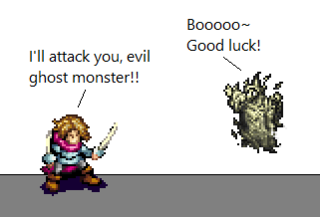
Megatokyo (メガトーキョー) is an English-language webcomic created by Fred Gallagher and Rodney Caston. Megatokyo debuted on August 14, 2000, and has been written and illustrated solely by Gallagher since July 17, 2002. Gallagher's style of writing and illustration is heavily influenced by Japanese manga. Megatokyo is freely available on its official website. The stated schedule for updates is Tuesday and Friday, but they typically are posted just once or twice a month on non-specific days. Recently, this schedule has slipped further, due to the health issues of Sarah Gallagher (Seraphim), Fred's wife. Megatokyo was also published in book-format by CMX, although the first three volumes were published by Dark Horse. For February 2005, sales of the comic's third printed volume were ranked third on BookScan's list of graphic novels sold in bookstores, then the best showing for an original English-language manga.

Sprite comics are webcomics that consist primarily of computer sprites from video games. Art assets are ripped from various classic games such as Mega Man and Sonic the Hedgehog, are edited and combined by amateur cartoonists, and are posted on the internet. Popularized by Bob and George in the early 2000s, the style is considered relatively easy for beginning cartoonists to get involved in, but sprite comics are generally looked down upon for being of low quality.
8-Bit Theater is sprite comic created by Brian Clevinger that ran from 2001 to 2010 and consisting of 1,225 pages. It is a sprite comic, meaning the art is mainly taken from pre-existing video game assets. The webcomic was at times one of the most popular webcomics, and the most popular sprite comic.

Mac Hall is a webcomic which was created through a bet between the creator Ian McConville and a friend who claimed he "couldn't make a comic like Penny Arcade". After the fifteenth comic, McConville was joined by Matt Boyd who began to write the comic.

Joey Manley was an American LGBT fiction author, web designer, and webcomics publisher. Manley wrote the successful LGBT novel The Death of Donna-May Dean in 1992. He moved to San Francisco in 2000 in order to work in web design. Manley was the founder and publisher of the Modern Tales family of webcomics websites, which included Modern Tales, Serializer, Girlamatic, Webcomics Nation, and others. Manley is considered one of the "founding pioneers" of the webcomic movement for creating a then-revolutionary subscription model.

Jeffrey Paul "Jeph" Jacques is an American cartoonist who writes and draws the webcomics Questionable Content, Alice Grove, and DORD.
The comic strip switcheroo was a massive practical joke in which several comic strip writers and artists (cartoonists), without the foreknowledge of their editors, traded strips for a day on April Fools' Day 1997. The Switcheroo was masterminded by comic strip creators Rick Kirkman and Jerry Scott, creators of the Baby Blues daily newspaper comic strip.

Sam and Fuzzy is a webcomic written and drawn by Sam Logan. It initially appeared in 2002 in The Martlet as a four-panel gag strip with a rough yet consistent, heavily contrasting black and white style. In May 2002 Logan began posting the strips on his website, and it quickly transitioned to an online format. Since then, it has run over 2,900 strips, and developed into a more story-driven format with multiple short arcs connecting into longer epic "volumes".
Dayfree Press was an online webcomic syndicate. Each Dayfree member had a special advertisement banner on their webpage that advertised the comics of another member-site. The ad was generated at random every time the page reloaded and sometimes showed an ad for the comics that were on the same webpage.
David M Willis is an American web cartoonist currently living in Columbus, Ohio. He is best known for his interconnected series of webcomics Roomies!, It's Walky!, Shortpacked!, and Dumbing of Age. Willis is also known online for his chatrooms and forums including "ItsWalky". KUTV in Salt Lake City calls him a satirist who is "a little bit edgy."

Ted Slampyak is an American comic strip cartoonist who drew Little Orphan Annie until its cancellation in 2010. He also draws the color webcomic Jazz Age Chronicles, a comic based in 1920s Boston. He is now the artist contributor to the Art of Manliness, a popular blog.
Dueling Analogs is a webcomic by Steve Napierski. The website was launched on November 17, 2005, and new comics were posted every Monday and Thursday. Dueling Analogs is a gaming comic and as such most of the comics take place in the universe of the games discussed. There are few ongoing stories or plotlines as all of the comics are self-encapsulated ; however, there are repeated themes such as 'Rejected Mega Man Villains', 'Games that I am glad were never made' and 'What if...?'. Dueling Analogs is also a founding member of a webcomic group of gaming comics. The comic came to prominence in the webcomic community after the "So Dark the Contra of Man" strip.
White Ninja is an animated webseries created by Scott Bevan and Kent Earle from Saskatoon, Saskatchewan, Canada. It was previously a webcomic that ran from 2002 to 2012 as part of the National Lampoon Humor Network. The comic was also part of Dayfree Press and ran exclusive strips on Cracked.com between August 2008 and April 2009. The comics were rebooted as a webseries, launched in 2015.
Sluggy Freelance is a long-running webcomic written and drawn by Pete Abrams. Starting in 1997, it is one of the oldest successful webcomics, and as of 2012 had hundreds of thousands of readers. Abrams was one of the first comic artists successful enough to make a living from a webcomic.
Christopher Hastings is an American comic writer and artist. He is known for his webcomic The Adventures of Dr. McNinja as well as writing for Unbelievable Gwenpool and the Adventure Time comics.
The history of webcomics follows the advances of technology, art, and business of comics on the Internet. The first comics were shared through the Internet in the mid-1980s. Some early webcomics were derivatives from print comics, but when the World Wide Web became widely popular in the mid-1990s, more people started creating comics exclusively for this medium. By the year 2000, various webcomic creators were financially successful and webcomics became more artistically recognized.
Notable events of 2000 in webcomics.
The business of webcomics involves creators earning a living through their webcomic, often using a variety of revenue channels. Those channels may include selling merchandise such as t-shirts, jackets, sweatpants, hats, pins, stickers, and toys, based on their work. Some also choose to sell print versions or compilations of their webcomics. Many webcomic creators make use of online advertisements on their websites, and possibly even product placement deals with larger companies. Crowdfunding through websites such as Kickstarter and Patreon are also popular choices for sources of potential income.







